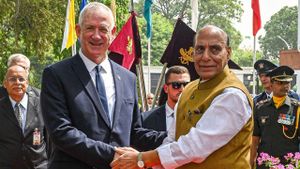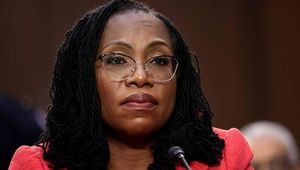Donald Trump has officially begun assembling his second cabinet as President of the United States, initiating what is shaping up to be another contentious and possibly unconventional transition of power. With the backdrop of significant legal battles still looming over his administration's last four years, many are left speculating about how this new roster will differ from the last.
Trump's transition team recently signed an agreement with the Justice Department allowing FBI background checks on his potential senior appointees, following weeks of hesitation. This move reflects not only his previous antagonistic stance toward the FBI—due to several investigations targeting him—but also the typical protocol for safeguarding national security secrets. Traditionally, such background checks have been routine, aimed at ensuring reliable candidates are trusted with sensitive information.
Despite this, there were early indications Trump might eschew standard protocols, considering employing private investigators instead. This alternative approach, which could have allowed him to personally grant security clearances to individuals without FBI vetting, raised eyebrows around Capitol Hill, particularly as it might contravene both legal and traditional expectations of nominating candidates to key positions. Observers noted the potential for utilizing private screening processes to bypass scrutiny usually provided by the FBI, challenging the Senate's independent authority during confirmation processes.
Trump's actions have already prompted discussion among Senate Republicans, where the dynamics are shifting since they anticipate holding the majority next year. Some Republican senators have already expressed the desire to continue with the standard vetting process to preserve the integrity of the government’s top appointments. These developments could indicate some bipartisan pushback against aspects of Trump's administration, depending on how he proceeds with nominations and background checks. A lapse in the traditional vetting process could result not only in political ramifications but also impact the broader functioning of the executive branch.
Meanwhile, as Trump assembles his cabinet, those expected to join him include some intriguing choices. Notorious for disrupting the status quo, forecasts suggest he may lean toward unorthodox appointments, signaling possible shifts away from traditional Republican policies. Figures such as Tulsi Gabbard and Robert F. Kennedy Jr. have been floated as potential nominees, indicating Trump’s intention to maintain his brand of unconventional politics.
Gabbard, with her military background and outsider status, and Kennedy, known for his controversial vaccine skepticism and environmental advocacy, exemplify Trump’s willingness to break from party norms. During his campaigns, he has framed himself as the solution to the establishment politics of Washington, and these appointments may reflect his commitment to offering something refreshingly different to his base.
Trump’s first-term policies receive mixed reviews, with supporters praising tax cuts and deregulations, yet facing criticisms over his handling of social issues, particularly those involving race and gender. This time around, he seems aware of the importance of appealing to younger voters, especially as he indicated support for more liberal policies, including marijuana legalization. His approach appears to intentionally cultivate 'vice voters'—a demographic interested less in traditional conservatism and more open to issues like cannabis reform and cryptocurrency economics.
His strategy could potentially build coalitions with those who feel disenchanted by prior administrations. Understanding the importance of this segment, he may continue advocating for what some might call ‘social moderation,’ by softening rhetoric on hardline stances traditionally associated with Republicans, such as strict anti-abortion laws.
The latest agreement with the Justice Department allows his team to initiate the FBI vetting process for senior officials, but there remains ambiguity about whether all candidates will be submitted for scrutiny. His campaign manager, Susie Wiles, insists this is about ensuring they are “ready on Day 1” to implement their agenda and prepares their senior staff to engage effectively with incoming information.
That said, there’s always the possibility of Trump appointing individuals who may choose not to undergo the vetting process altogether. Historically, such refusals have led to trouble for other administrations, as congressional scrutiny becomes necessary at pivotal moments, particularly the confirmation of cabinet positions. Trump’s disregard for such checks may resonate with his base but could result in entrenched opposition from Democrats and moderate Republicans alike.
The backdrop of Trump's decision-making is punctuated by his recent comments inviting speculation about his commitment to remaining standard with expected protocols or wandering down the path of unpredictability. Through it all, his stranglehold on the narrative—in urging his supporters to see themselves as historical participants—will be tested particularly by how his administration once again engages with longstanding political expectations.
Today, as Trump moves toward finalizing his cabinet selections, all eyes will be on his nominees. Will they echo the populist, anti-establishment themes he cultivated before, or will they represent the establishment he claims to dethrone? There’s no telling for sure, but one thing’s clear: any cabinet he assembles will become part of the saga of governance for the next four years, inevitably intertwining with his undying ambition and the narrative he carefully spins through public discourse.
With headlines buzzing around potential nominees and the eccentric character of many candidates, the upcoming confirmations represent more than merely political appointments; they signal Trump’s ability to navigate through chaos, using it, as ever, to embolden his unique brand of leadership.



